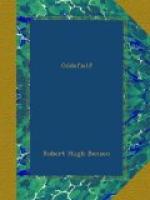His Royal Highness broke out, when he had done, declaring the whole matter a bundle of lies; and when one or two asked Oates for any writings or letters that he had—since he had been so long amongst the Jesuits, and was so much trusted by them—he said that he had none; but could get them easily enough if warrants and officers were given him. I suppose the truth was that he had not wit enough to write them as yet, but had thought the Windsor letters (as I may call them) would be enough. (These questions had also been put to him on the day before, but were repeated now for the King’s benefit.)
His Majesty himself, I think, proved the shrewdest examiner of them all.
“You said that you met Don Juan, the Spaniard, in your travels, Doctor Oates. Pray, what is he like in face and figure?”
“My Lard—Your Majesty,” said Oates, “he is a tall black thin faylow, with swatthy features”—(for so he pronounced his words.)
“Eh?” asked the King.
Dr. Oates repeated his words; and the King turned, nodding and smiling, to His Royal Highness; for the Spanish bastard is far more Austrian than Spanish, and is fair and fat and of small stature.
“Excellent, Doctor Oates,” said the King. “And now there is another small matter. You told these gentlemen yesterday that you saw—with your own eyes—the bribe of ten thousand pound paid down by the French King’s confessor. Pray, where was this money paid?”
“In the Jesuits’ house in Paris, your Majesty,” said the man.
“And where is that?”
“That—Your Majesty—that house is—is near the King’s own house.” (But he spoke hesitatingly.)
Then the King broke out in indignation; and beat his hand on the table.
“Man!” he cried. “The Jesuits have no house within one mile of the Louvre!”
It pleased me to hear the King say that; for I was a little uneasy at Father Whitbread’s manner when he had spoken of the King’s promise; but I was less pleased a day or two afterwards to hear that His Majesty was gone to Newmarket, to the races, and had left the Council to do as best it could; and that the Jesuits had been taken that same night—Michaelmas eve—after Oates had been had before the Council. There had been a great to-do at the taking of Father Whitbread, for the Spanish soldiers had been called out to save the Ambassador’s house, so great was the mob that went to see him taken.
* * * * *
The next public event in the whole affair was the last and worst of all the links that were being forged so swiftly: and the news of it came to me as follows.
I had gone to sup in Aldgate, where I had listened to a good deal of talk from some small gentry, as to the Papist plot; and had been happy to hear three or four of them declare that they believed there was nothing in it, and even the rest of them were far from positive on the matter; and I had stayed late over my pipe with them, so that it was long after my usual time when I returned towards my lodgings, walking alone, for I said good-bye to the last of my companions in the City.




